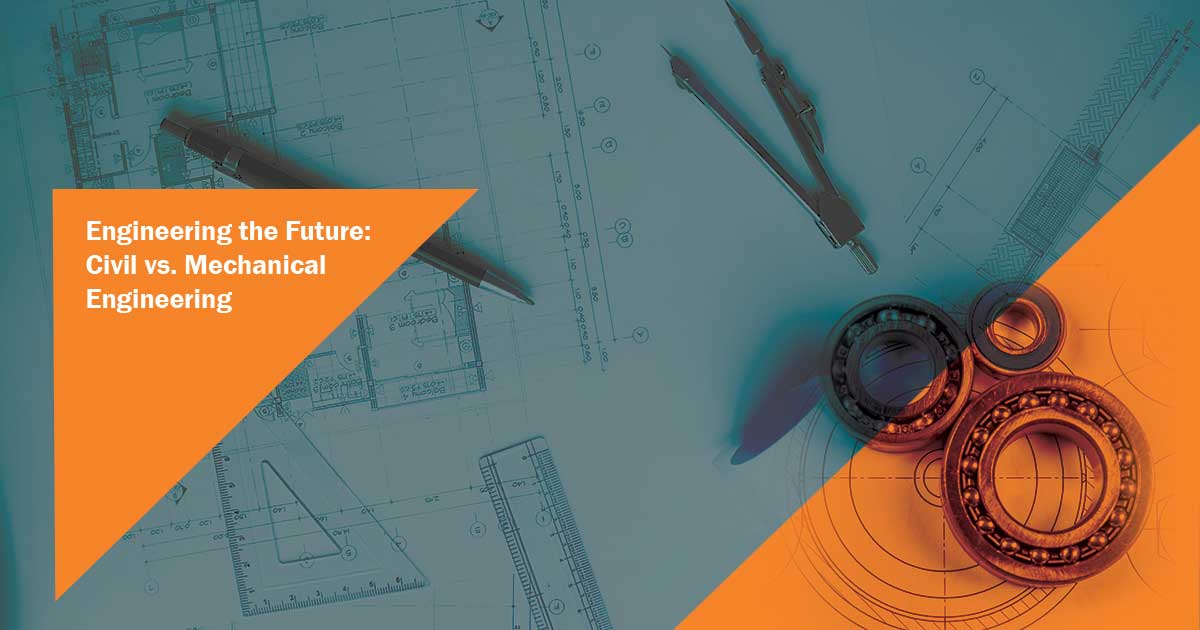FET Blogs


FET Blogs



16 October 2023
One of the most confusing yet important decisions for students is to choose the right engineering stream!
Amidst the multitude of options prevalent, two most common streams emerge, i.e., civil and mechanical engineering. While civil engineering is concerned with the development of infrastructure around us, mechanical engineering explores areas of the design and operation of machinery. Today, in this blog, we shall understand the differences between these two areas of engineering!
The undergraduate (UG) course offered in civil engineering is a Bachelor of Technology (B.Tech) in civil engineering. This programme has a duration of 4 years, further classified into 8 semesters. Additionally, students can pursue a Master of Technology (M.Tech) in civil engineering. This post-graduate programme with course duration of 2 years, split across 4 semesters. Students can also pursue higher education in the same field by opting for a Doctor of Philosophy (Ph.D).
In mechanical engineering, the UG programme entails a B.Tech. in the same field, which has a duration of 4 years, divided into 8 semesters. Students can also pursue higher education by enrolling on a master's programme, which is a 2-year course. Similarly, students can also pursue a Ph.D. in mechanical engineering, with a total duration of one year.
Civil engineering curriculum imparts knowledge on the design, development, and maintenance of large-scale infrastructure. Besides theoretical exposure, the curriculum also ensures that students gain practical experience through internships, industrial projects and case studies. The core subjects included in a civil engineering curriculum consist of geotechnical engineering, mathematics, civil mechanics, structural analysis and design, hydraulics, transportation engineering, environmental engineering, geomatics, and others.
The curriculum of mechanical engineering is a combination of theoretical and practical exposure. While the theory part focuses on the design, analysis, and manufacturing of mechanical systems and devices, students gain experiential learning through experiments, case studies, and internships. The core subjects included in a mechanical engineering curriculum consist of engineering mathematics, engineering mechanics, thermodynamics, fluid mechanics, heat transfer, material science and engineering, machine design, the dynamics of machinery, manufacturing processes, mechanical vibrations, and others.
Civil engineering offers exciting career advancement opportunities across different industries. Upon graduation, students can work on the construction of buildings, bridges, roads, and infrastructure projects. They can also work in the transportation industry to design and manage transportation systems. Let us see some of the promising career roles in this domain:
Construction engineers oversee construction projects, thereby ensuring that these projects are completed safely, on time, and within budget. Structural engineers design and analyse structures like buildings and bridges for stability and safety. Geotechnical engineers study soil and rock mechanics, which are essential for foundations and underground structures. Transportation engineers plan and design transportation systems, such as roads and public transit. Environmental engineers address environmental challenges such as water and air quality and sustainable development.
Mechanical engineering offers lucrative career opportunities for students across different sectors. After completing the course, students can explore diverse career opportunities in the manufacturing, aerospace and automotive industries. Let us see some of the top career prospects in this domain:
Mechanical engineers design and analyse mechanical components and systems using CAD software and engineering principles. Manufacturing engineers enhance manufacturing processes and ensure that the product maintains optimum quality and efficiency. Aerospace engineers develop aircraft, spacecraft, and related systems, ensuring that they meet safety, performance, and regulatory standards. Automotive engineers conceptualise, design and develop vehicles and their components They design, analyse, and optimise thermal solutions to ensure efficient heat dissipation, temperature control, and thermal performance.
Although both civil and mechanical are two branches of engineering and offer exciting career prospects in their respective domains, they are very different from each other. Expertise in structural analysis, construction management, hydraulics and AutoCAD are some of the key skills that students can learn in a civil engineering course. On the other hand, students will gain valuable knowledge and skills in areas such as mechanical design, thermodynamics and heat transfer, manufacturing processes, and fluid mechanics. Therefore, students must carefully analyse their area of interest and the type of expertise they want to develop before making the final call!
A1: While it is uncommon to directly become a "mechanical engineer" with only a civil engineering degree, a civil engineer can certainly transition into roles, especially in areas like water systems, pump and pressure equipment, or pipelines, which overlap with mechanical engineering fields.
A2: There is no single “best” branch as it mainly depends on an individual’s interests and goals.
Mechanical engineering offers versatility across industries like automotive, aerospace, energy, and manufacturing.
Civil engineering focuses on infrastructure including bridges, roads, water systems, and buildings.
Students should choose mechanical engineering if they like machinery, design, and automation. They should choose civil engineering if they enjoy construction, infrastructure, and large-scale projects.
A3: Generally, mechanical engineers earn slightly more on average in India.
Mechanical Engineers' Average Salary
Entry-level - Rs.3 LPA – Rs.5 LPA
Mid-level - Rs.6 LPA – Rs.12 LPA
Senior-level - Rs.15 LPA – Rs.25 LPA or more
Civil Engineers' Average Salary
Entry-level - Rs.3 LPA – Rs.4.5 LPA
Mid-level - Rs.5 LPA – Rs.10 LPA
Senior-level - Rs.12 LPA – Rs.20 LPA or more
Mechanical roles often pay more due to their presence in higher-paying sectors like aerospace and manufacturing.
A4: Mechanical engineering is certainly a promising choice for a rewarding career. The demand for mechanical engineers is constantly rising due to growth in automotive, aerospace, robotics, and renewable energy. Mechanical engineers with updated skills are in high demand because of emerging technologies like AI, automation, nanotech, and EVs.
Popular Post
04 March 2026
BTech Mechanical Engineering Syllabus & Subjects List
04 March 2026
B.Tech EEE Jobs, Scope & Salary in India
17 February 2026
AIE Full Form
10 February 2026
AEIE Full Form
Ask an Expert for Free